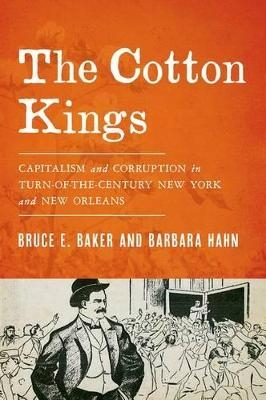
The Cotton Kings
Oxford University Press Inc (Verlag)
978-0-19-021165-3 (ISBN)
The Cotton Kings relates a rip-roaring drama of competition in the marketplace and reveals the damage markets can cause when they do not work properly. It also explains how they can be fixed through careful regulation. At the turn of the twentieth century, cotton was still the major agricultural product of the American South and an important commodity for world industry. Key to marketing cotton were futures contracts, traded at exchanges in New York and New Orleans. Futures contracts had the potential to hedge risk and reduce price volatility, but only if the markets in which they were traded worked properly. Increasing corruption on the powerful New York Cotton Exchange pushed prices steadily downwards in the 1890s, impoverishing millions of cotton farmers. The U.S. Department of Agriculture tried to solve the problem with better crop predictions and market information, shared equally and simultaneously with all participants, but these efforts failed.
To fight the cotton market's corruption, cotton brokers in New Orleans, led by William P. Brown and Frank Hayne, began quietly to assemble resources. They triumphed in the summer of 1903, when they cornered the world market in cotton and raised its price to reflect the reality of increasing demand and struggling supply. The brokers' success pushed up the price of cotton for the next ten years. However, the structural problems of self-regulation by market participants still threatened the cotton trade. More corruption at the New York Cotton Exchange appeared, until eventually political pressure inspired the Cotton Futures Act of 1914, the federal government's first successful regulation of a financial derivative.
Bruce E. Baker teaches at Newcastle University in England and is co-editor of the journal American Nineteenth Century History. He is the author of What Reconstruction Meant: Historical Memory in the American South, This Mob Will Surely Take My Life: Lynchings in the Carolinas, 1871-1947, After Slavery: Race, Labor, and Citizenship in the Reconstruction South, and The South at Work: Observations from 1904. Barbara Hahn is associate professor of history at Texas Tech University and associate editor of Technology and Culture. She is the author of Making Tobacco Bright: Creating an American Commodity, 1617-1937. She is spending 2014-2016 as a Marie Curie International Incoming Fellow at the University of Leeds, UK.
Introduction ; Ch 1 New Orleans and the Future of the Cotton Trade ; Ch 2 The Value of Information ; Ch 3 Building a Bear Trap ; Ch 4 Cornering Cotton ; Ch 5 Of Weevils and Wool Hats ; Ch 6 Of Scandals, Sunshine, and Manipulation ; Ch 7 Revenge of the Bears ; Ch 8 The Perpetual Squeeze ; Ch 9 The Cotton Futures Act of 1914 ; Conclusion ; Notes ; Bibliography ; Index
| Zusatzinfo | 20 hts |
|---|---|
| Verlagsort | New York |
| Sprache | englisch |
| Maße | 155 x 236 mm |
| Gewicht | 522 g |
| Themenwelt | Geschichte ► Allgemeine Geschichte ► Neuzeit (bis 1918) |
| Geisteswissenschaften ► Geschichte ► Regional- / Ländergeschichte | |
| Geschichte ► Teilgebiete der Geschichte ► Kulturgeschichte | |
| Geschichte ► Teilgebiete der Geschichte ► Wirtschaftsgeschichte | |
| Sozialwissenschaften ► Politik / Verwaltung | |
| ISBN-10 | 0-19-021165-2 / 0190211652 |
| ISBN-13 | 978-0-19-021165-3 / 9780190211653 |
| Zustand | Neuware |
| Haben Sie eine Frage zum Produkt? |
aus dem Bereich


